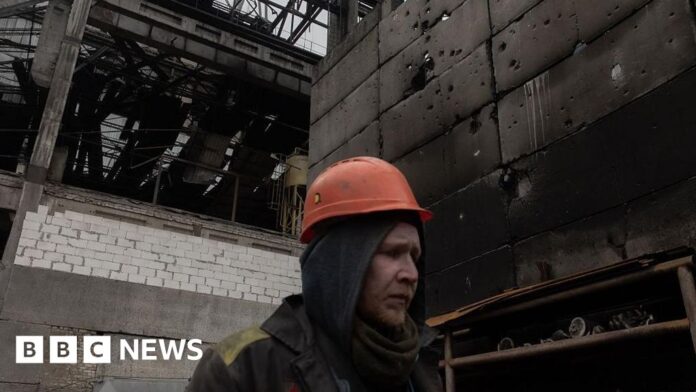Vital supplies of US liquefied natural gas are due to start flowing into war-ravaged Ukraine this winter via a pipeline across the Balkans.
The deal was announced after Ukrainian President Volodymyr Zelensky met Greek Prime Minister Kyriakos Mitsotakis in Athens on Sunday. Greece is working to increase the flow of American LNG to its terminals to “replace Russian gas in the region”, Mitsotakis said recently.
The European Commission plans to ban all imports of Russian gas to EU member states by the end of 2027, arguing revenue from such sales funds Russia’s war in Ukraine.
In Ukraine, which experiences freezing winters, there are fears of an energy crisis as Russia attacks energy facilities.
Zelensky is currently in France, where he President Emmanuel Macron signed a letter of intent to buy up to 100 Rafale jets.
Fighting continued overnight, with six people reportedly killed in Russian attacks in the Kharkiv, Kherson and Donetsk regions of Ukraine.
Russia’s military said it had taken control of three more Ukrainian villages – one each in the Kharkiv, Donetsk and Dnipropetrovsk regions.
None of the reports could be independently verified.
Speaking earlier in Athens, Zelensky was quoted as saying that deliveries of US LNG would begin in January.
“We rebuild each time the Russians destroy but this truly requires time, much effort, equipment and, regarding gas… imports to compensate for the destruction by the Russians of our own production,” he said.
“Greece is becoming an energy security provider for your homeland,” Mitsotakis told the Ukrainian president.
Zelensky said Kyiv had allocated funds for gas imports from European partners and banks under European Commission guarantees, as well as from Ukrainian banks, to help cover imports through to March at a cost of nearly €2bn (£1.8bn; $2.3bn), according to news agency Reuters.
Since 2015, when it stopped buying Russian gas directly, Ukraine has been receiving supplies from various EU states.
The Soviet-era Trans-Balkan pipeline links Ukraine to LNG terminals in Greece via Moldova, Romania and Bulgaria.
The UN Office for the Co-ordination of Humanitarian Affairs has issued a formal warning, saying “the approaching winter poses new risks for Ukrainians… as intensified attacks on energy networks undermine efforts to maintain warmth in homes, schools and health centres”.
The letter signed by Zelensky and Macron while visiting the Villacoublay air base near Paris sets out possible future contracts for Ukraine to acquire Rafale fighter jets “with their associated weapons”.
The letter, which is not a purchase and sales contract, also sets out deals for SAMP-T air defence systems, radar systems and drones.
On an visit to Sweden last month, Zelensky signed a letter of intent to buy between 100 and 150 Gripen fighter jets.
In France, Zelensky also went to Mont Valerien, to the west of Paris, to visit the nascent headquarters of a planned multinational force.
The force, which was proposed by the UK and France, may one day help oversee a Ukraine-Russia ceasefire.
Tens of thousands of people, most of them soldiers, have been killed or injured, and millions of civilians have fled their homes, since Russian President Vladimir Putin launched his full-scale invasion of Ukraine in February 2022.
Russia currently controls about 20% of Ukraine’s territory and has been making slow advances along the front line as the Ukrainian military grapples with manpower shortages.
Fighting has centred on the town of Pokrovsk, a logistical hub in Donetsk region, where hundreds of Russian troops recently broke through.
Ukraine’s ongoing refugee crisis took another turn this month when German Chancellor Friedrich Merz urged Zelensky to take action after a surge in the number of young Ukrainian men arriving in Germany and other EU states as refugees.
EU states recorded 79,205 new Ukrainian refugees in September, the highest monthly number in nearly two years.
In its report, the EU’s statistical agency pointed to Ukraine’s decision in August to allow men aged 18 to 22 the right to cross the border freely.
At the time of the invasion, martial law dictated that men aged between 18 and 60 – even those not eligible for conscription, which is currently in place for those aged between 25 and 60 – were not permitted to leave the country.
Germany, the EU’s biggest country, now hosts the most Ukrainian refugees – currently 1.2 million people or 28.3% of the bloc’s total.


